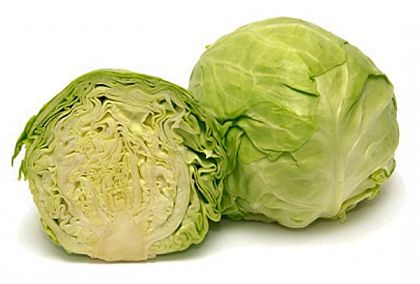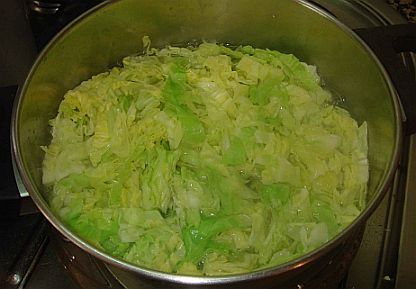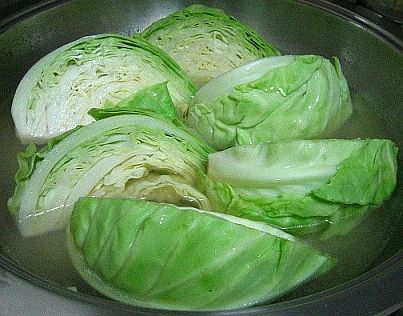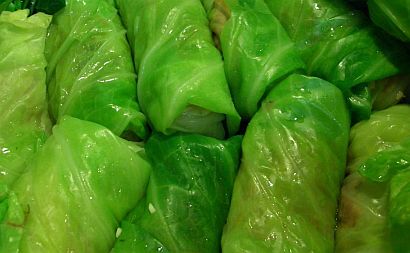Can You Freeze Cabbage?
Cabbage is a popular vegetable that can actually store for quite some time in the fridge. However, to prolong its life span you can certainly freeze cabbage and enjoy it for a later occasion. Let’s take a closer look.

Green cabbage
Common Types of Cabbage
You probably know that cabbage comes in different varieties such as:
- Green Cabbage – The most popular cabbage, and can be eaten raw but also used in stir-fry recipes, soups, and braises. Green cabbage leaves are also used to make cabbage rolls.
- Red Cabbage – Used often in coleslaw and leafy green salads.
- Savoy Cabbage – Very good to use in cooked dishes such as soups and stir-fries.
- Bok Choy – Great for steaming to soften it up, and then it can be used in stir-fry and soup recipes.
In most cases, when we think of cabbage, we tend to think of the green and red cabbage which are delicious when eaten raw, lightly cooked, steamed, stir-fried, or boiled and they can both be frozen before making any of these dishes. Luckily, freezing cabbage can be done fairly easily. How you go about freezing cooked cabbage or freezing fresh cabbage will depend on how you plan to use it.
How Do You Freeze Cabbage?
Freezing cabbage can change its texture. A once crisp head of cabbage will become soggy, however, the flavor can be retained. Due to the change in texture, using frozen cabbage for coleslaw, salads, or other recipes that require a crispy crunch to them is not ideal.
The best way and safest way of freezing cabbage is to prepare it for blanching. Why do you want to blanch? Well, blanching is a very important process in freezing cabbage. The reason for this is because it stops the actions of enzymes, which are present in the raw cabbage. Enzymes are active in the ripening process of vegetables, so blanching will prevent the natural maturation process that may otherwise lead to your frozen cabbage becoming less appetizing. It will also help in killing any microorganism present in the cabbage.
Instructions of how to freeze cabbage:
1. To prepare raw cabbage for freezing, you will take the a head of cabbage and remove the outer leaves. Then wash the cabbage or let it float in water in the sink. This will take care of any unwanted “guests” the cabbage may carry.
2. Cut the cabbage in large wedges. Alternatively, you can have the cabbage shredded or cut in small pieces.
3. Time for the blanching process. Boil water in a large pot and once it start boiling you add the cabbage wedges and let them cook for 3 minutes. If you have shredded or cut the cabbage in small pieces cook them for only 1.5 minutes. (You can use a wire basket in a large pot and it would be easier to remove the cabbage once done.)

Boiling shredded cabbage.
4. After the boiling process, plunge cabbage immediately into a large quantity of cold water that is 60ºF or below. You can use cold running water or ice water. Cooling the cabbage should take about the same amount of time as blanching. Drain the cabbage thoroughly after cooling so that extra moisture doesn’t negatively affect the quality when the cabbage freezes.

Cooling off cabbage wedges.
5. You can then pack the cabbage in serving size portions in freezer bags or food containers. Using a vacuum sealer is also a good way to store the cabbage before you put it in the freezer.
Freezing Cooked Cabbage
Freezing cooked cabbage or leftover cabbage is also possible. For this you just put it in freezer bags or containers. Nothing complicated with this, but make sure you keep it in airtight containers and label your frozen cabbage with the date it was stored.
Freezing Cabbage For Cabbage Rolls
If you plan on making cabbage rolls and want to make the wrapping process a lot easier, just place a cabbage head in an airtight freezer bag and place it in the freezer. Once the cabbage is frozen, take it out of the freezer 24 hours before making the cabbage rolls. When it’s thawed you can easily peel of the leaves without them breaking or tearing. Wash the leaves and roll up the contents of the recipe you are preparing and cook. Remember that the cabbage is still raw even though it is soft.

Freezing Raw Cabbage
You can obviously freeze raw cabbage, but blanching is the best way to go if you want to store the cabbage for a longer time. It kills bacteria and retains color, flavor and texture, but does also help retarding the loss of vitamins.
FAQs
– Can you freeze cabbage soup?
Cabbage soup is perfectly fine to freeze.
– How do I store raw cabbage in the refrigerator?
Refrigerate raw cabbage in the crisper drawer of your refrigerator if possible. Store it in a plastic bag and it will help to retain the moisture. Keeping the outer leaves on the cabbage also helps to keep in moisture and protects the inner parts that you will prepare later. Don’t wash the cabbage until you plan to use it. If you take these steps, raw cabbage can last 3 weeks to 2 months.
– What authorities do not recommend freezing cabbage without blanching?
In the U.S., there is the National Center of Home and Food Preservation. This is a funded project were USDA is among the funding partners.
References:
http://nchfp.uga.edu/how/freeze/cabbage.html

 Facebook
Facebook  Twitter
Twitter  RSS
RSS







